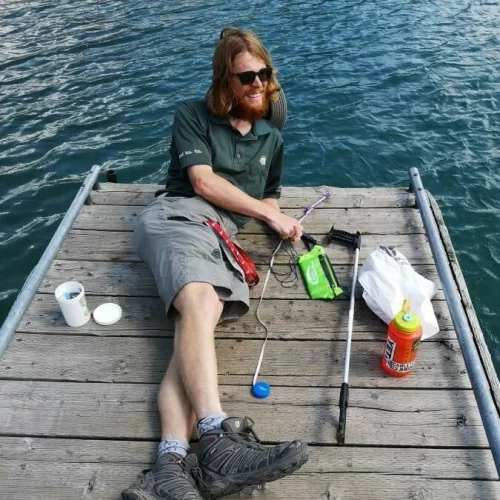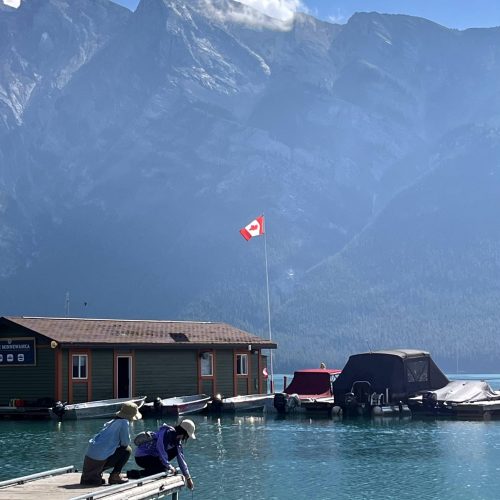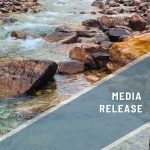Chris Pratt monitors lakes in Banff National Park
The Lake Blitz Volunteer Spotlight series gives us the opportunity to show appreciation for our remarkable Lake Blitz volunteers. From B.C. to Nova Scotia, hundreds of volunteers have helped to create a snapshot of lake health by collecting temperature readings and taking photos of the lake they’ve decided to monitor to better understand climate impacts.
We are excited to present our latest volunteer to be featured in this series: Chris Pratt, who is joining in on the Lake Blitz from Alberta!
Q – What is your background? 
A – I’m a fourth year undergraduate student originally from Calgary. Currently, I’m attending Carleton University in pursuit of a Bachelor of Global and International Studies specializing in Global Development.
Q – What lake(s) are you monitoring (include province)?
A – Last summer, I coordinated volunteers on behalf of Parks Canada that participated in monitoring Lake Minnewanka, Two Jack Lake, Johnson Lake, Cascade Ponds, Vermillion Lakes and Boom Lake in Banff National Park, Alberta.
Q – Do you have a personal connection to your lakes?
A – Lake Minnewanka has always been one of my favourite lakes in Canada. I have had the opportunity to do a number of hikes around the lake and up the various mountains that surround it and the lake never fails to take my breath away. A few of my friends have also somehow managed to convince me to swim in it a few times throughout the summer, so I will also have those type two fun memories with me for life.
Q – What motivated you to volunteer with the National Lake Blitz?
A – As the Parks Canada Volunteer Activities Coordinator for Banff National Park last year, I was looking for activities that were open and inclusive for large and diverse groups but which also had a demonstrated meaningful impact on the magical ecosystem that is Banff National Park and the Canadian Rocky Mountains. Living Lakes Canada’s Lake Blitz was instantly an opportunity that ticked all of those boxes and was also impressive from the point of view that this national volunteer-driven campaign has been going on for three years now – resulting in enormous amounts of data that will be incredibly useful for conservation efforts across Canada.

Q – What concerns do you have about the future health of your chosen lake?
A – The history behind Lake Minnewanka has already demonstrated the impact that humans have when we engage with the ecosystem that surrounds us without fully knowing the amazing intricacies that make the Canadian wilderness as beautifully functional as it is. The Threatened Westslope Cutthroat Trout has been specifically impacted by the damming of the Cascade River and the creation of Lake Minnewanka as we know it today, which makes gathering data on the condition of lakes and the animal and plant species that make Canadian lakes their home so important. Without having knowledge on our lakes available and accessible, Canadians will not be able to make informed advocacy decisions on how best to preserve the magical lakes that we all enjoy so much and which are home to so many wonderful creatures.
Q – What is your favourite bird, fish or other wildlife species you see at your lake?
A – I saw a Western or Canadian Toad last summer in Boom Lake (that Toad was moving with a purpose so I did not get a good enough look to determine which) which was super cool. I really enjoy Toads just because of their on-land and in-water movement style.
Q – What is one thing everyone can do to protect their local lakes?
A – For me, protection of the Great Outdoors always starts with developing a passion. So go out there and hike around your lake, skate on it in the winter (safely), swim in it (if you are crazy and enjoy Type 2 fun), do all the paddle sports, bird watch, fish, etc. Develop a passion for it and memories with a lake so that when decisions involving the environment are being made, we have people in Canada that truly understand what exactly is at stake.
Banner image: Lake Minnewanka, AB. Photo by Denise Kitagawa, 2023 Lake Biodiversity Photo Challenge.





